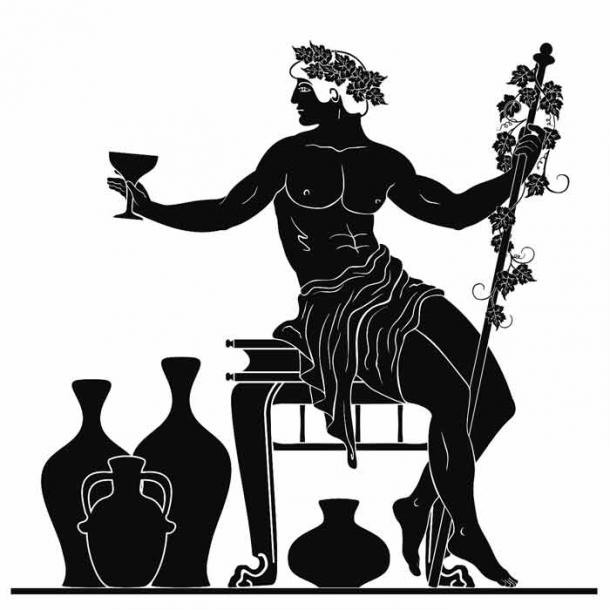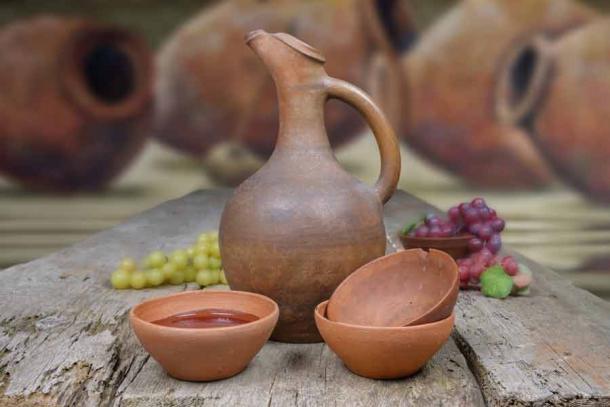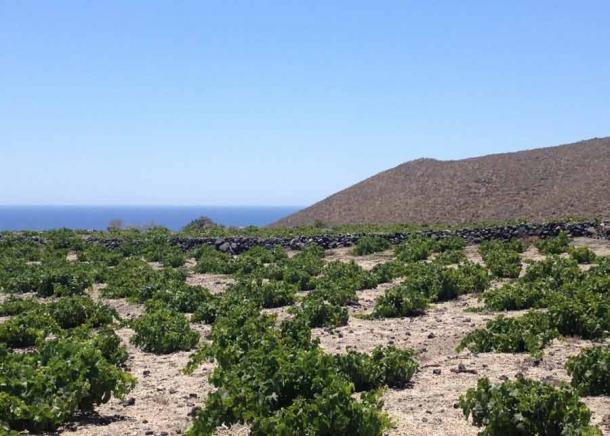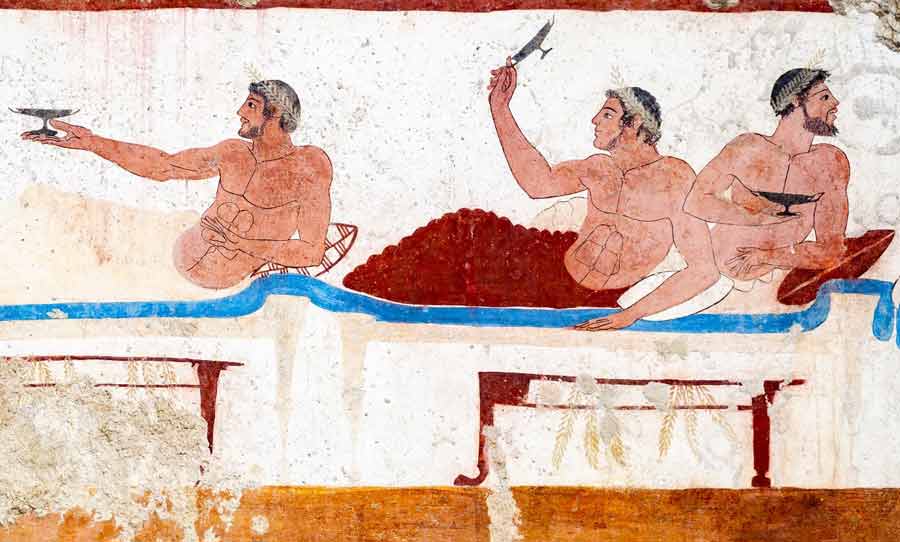Heavily Seasoned: Why did the Ancients Like Salty Wine?
The history of wine stretches back to around 6,000 BC in the country of Georgia near the Caucasus mountains. However, knowledge of the wine and the wine-making process is scant at best. The most in-depth knowledge of wine and the production process of ancient civilizations that is available comes from the Roman Empire.
Marcus Cato (The Elder), an important political figure who became Consul (a joint ruler) of Rome in 195 BC, wrote a treatise on farming and agriculture. In it, he spoke of the wine-making process including the addition of salt water to the wine, and the imitation of Greek wine that would be imported into Rome and throughout the empire.
But why was it so important? How was it made? How much of a role did it play in the lives of ancient civilizations? And finally, why was saltwater added to the mixture?
Classical Greece
Ancient Greece is famous for the complex culture around wine and its consumption. Not only was wine an important trade commodity that found lucrative opportunities around the world, but it also held a place in both religious and medical arenas. There was a festival known as the “feast of the wine” and a cult of Dionysus, the Greek God of wine, fertility, and festivity, active in the earliest years of ancient Greece. Euripides, an ancient playwright, even wrote a play signifying the importance of Dionysus and his cult to Greek Culture.

Dionysus, Greek God of Wine and Winemaking (Migfoto / Adobe Stock)
The medicinal use of wine was frequently researched by the Greeks. Hippocrates, a pioneer of medicine, considered wine as an integral part of a healthy diet. As well as this he used wine as a disinfectant on wounds and experimented with different wines to see which one would work best as a good base to mix other drugs and medicines into. Specifically, wine was prescribed to cure ailments such as diarrhea and pain during childbirth.
However, they also recognized that wine also had negative health effects especially when wine was consumed in excess. Many contemporaries noted the ideal amount of wine to drink. It was suggested that three bowls or Kylix, the Greek drinking vessel, was the right amount to consume. This is still used today as a standard bottle of wine that has 3 glasses in it.
- History of Pompeii: Its Rise, Decadent Heyday, and Destruction
- Celtic Prince of Lavau and His Opulent Tomb
To highlight the importance of wine in Greek culture, one can look at Homer’s Greek classic The Odyssey, from the oral tradition over 2,500 years ago. Wine is mentioned over ten times in the epic. It is mostly concerning feasts or religious ceremonies. Men were expected to drink wine in moderation, and only when mixed and consumed with food.
It is not surprising then that the Romans followed suit with the Greeks and consistently enjoyed wine throughout the ages.
How Was It Made?
The ancient Greeks associated the invention of wine pressing with Dionysus. Homer described the Shield of Achilles showing the grape harvest and how it was protected. In addition to this, Laertes, father of Odysseus is recorded to have had over 50 grape varieties in his vineyard. These are two of the most prominent heroes in Greek mythology so for them to be associated with winemaking shows the importance of wine to Greek culture.

Winemaking dates back at least 8,000 years. (Luka / Adobe Stock)
A 4th century BC writer Theophrastus, a successor to Aristotle, wrote of the study of vineyard soils and hoped to match them to specific grapevines. He left a detailed manuscript on yield rotation and harvesting of plant cuttings to ensure easier cultivation.
When the grapes were ready for crushing, wicker baskets were stored inside wooden or earthenware vats with a rope or plank placed above. The grapes were then crushed using the feet of workers and were occasionally festively accompanied by music. After this, they were placed in jars for fermentation called pithoi, large containers similar to modern-day casks or drums.
The Greeks continued to innovate wine production through straw wine production, the process of drying out grapes to raisins before pressing. This created a more acidic wine for blending. With this, they were known to add different flavorings such as resin, herbs, spices, brines, and oils. Mulled wine and vermouth are some of the legacies of this practice. This was not the only ingredient that could be added to the mix though.
- What Is the Oracle of Delphi and How Did She Prophesize?
- Treatment of Slaves, Boys & Women in Sparta
Seawater
Drinking wine that was not mixed with water in Greek culture was considered barbaric. A wine that had not been mixed should only be used as medicine or as a tonic when traveling. Contemporary writings have stated that the way to make wine was to mix 50 parts must, freshly crushed grape juice containing skins and stems, with 1 part seawater. This was taught by Dionysus after he was threatened by the King of Thrace and hid in the sea. This kind of wine was known as ‘Wine that smells like flowers’ because of the smell that it produces when the must is mixed with seawater.

Assyrtiko Vines on Santorini, used to produce thalassitis wine (Jameson Fink / CC BY 2.0)
Other than taste, a reason to mix wine and seawater was for the longevity that it gave the wine. This was particularly prominent on the island of Kos. It was this wine that spread throughout the world. It is one that gained particular mention by Cato in his book on agriculture. It is still used, albeit in a small amount, today to produce wines. Thalassitis wine is still being produced and is made by submerging the grapes in seawater before they are crushed.
How Important Is Wine To Ancient Cultures?
Wine played a prominent role in the Ancient Greek and then Roman cultures. It was seen as a mark of civilization and as such needed to be drank in moderation. It was a mark of the wealthy and powerful. However, there was also the mystical and religious connection to the gods that the wine allowed for, as the drinker became more inebriated. Both civilizations had festivals dedicated to the overindulgence of wine. The use of salt and seawater is just another nuance to the entire facet of wine drinking culture on these isles. There was more to wine than the delicious bottles we enjoy today.
Top Image: Three Greek youths wonder where the wine has gone. Paestum, 470 BC. Source: BlackMac / Adobe Stock.
By Kurt Readman
References
Chrysopoulos, P. 2021. Why Ancient Greeks Mixed Wine with Seawater. Available at: https://greekreporter.com/2021/06/12/why-ancient-greeks-mixed-wine-with-seawater/
Danny. 2021. Why Did We Used to Water Down Wine? Available at: https://medium.com/exploring-history/why-watering-down-wine-was-once-the-height-of-sophistication-aa48689fe175
Eberle, U. 2020. This Seawater-Infused Wine Is Sweet, Thick, and Not at All Salty. Available at: https://www.hakaimagazine.com/news/this-seawater-infused-wine-is-sweet-thick-and-not-at-all-salty/
Facts and Details, 2018. WINE, DRINKING AND ALCOHOLIC DRINKS IN ANCIENT GREECE. Available at: http://factsanddetails.com/world/cat56/sub406/entry-6201.html#chapter-1
Grout, J. 2021. Wine and Rome. Available at: https://penelope.uchicago.edu/~grout/encyclopaedia_romana/wine/wine.html
Jouanna, J. 2012. Greek Medicine from Hippocrates to Galen: Selected Papers. Available at: https://www.jstor.org/stable/10.1163/j.ctt1w76vxr.15?seq=1#metadata_info_tab_contents
Meijer, C. and van Oppen, B. 2018. Wine culture in the Hellenistic Mediterranean. Available at: https://www.ancientworldmagazine.com/articles/wine-culture-hellenistic-mediterranean/
Moore, J. 2010. When not just any wine will do. Pp.89-123. Available at: file:///C:/Users/user/Downloads/When_Not_Just_Any_Wine_Will_Do_The_Proli.pdf
NPR. 2012. 'Inventing Wine': The History Of A Very Vintage Beverage. Available at: https://www.npr.org/2012/12/04/166186416/inventing-wine-the-history-of-a-very-vintage-beverage
Senses. 2013. Ancient Wine. Available at: https://www.senseswines.com/2013/06/ancient-wine
Suzuki, D. 2020. What Did Wine Taste Like Two Thousand Years Ago?. Available at: https://www.cbc.ca/natureofthings/features/what-does-a-two-thousand-year-old-wine-taste-like
Vinifera. 2009. Why did the ancient Greeks and Romans drink their wine mixed with water? Available at: https://www.winespectator.com/articles/why-did-the-ancient-greeks-and-romans-drink-their-wine-mixed-with-water-5063
Wynne, J. 2021. A History of Wine. Available at: https://www.arenaflowers.com/blogs/news/history-of-wine/



















